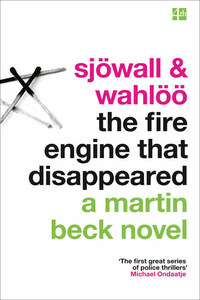This novel is entirely a work of fiction. The names, characters and incidents portrayed in it are the work of the author’s imagination. Any resemblance to actual persons living or dead, events or localities is entirely coincidental.
4th Estate
An imprint of HarperCollinsPublishers Ltd. 1 London Bridge Street London SE1 9GF
www.harpercollins.co.uk
This ebook first published by Harper Perennial in 2007
This 4th Estate edition published in 2016
This translation first published by Random House Inc, New York, in 1971
Originally published in Sweden by P. A. Norstedt & Söners Forlag
Copyright text © Maj Sjöwall and Per Wahlöö 1969
Copyright introduction © Colin Dexter 2007
Cover photograph © Shutterstock
Maj Sjöwall and Per Wahlöö assert the moral right to be identified as the authors of this work
A catalogue record for this book is available from the British Library
All rights reserved under International and Pan-American Copyright Conventions. By payment of the required fees, you have been granted the non-exclusive, non-transferable right to access and read the text of this ebook on-screen. No part of this text may be reproduced, transmitted, down-loaded, decompiled, reverse engineered, or stored in or introduced into any information storage and retrieval system, in any form or by any means, whether electronic or mechanical, now known or hereinafter invented, without the express written permission of HarperCollins ebooks
HarperCollinsPublishers has made every reasonable effort to ensure that any picture content and written content in this ebook has been included or removed in accordance with the contractual and technological constraints in operation at the time of publication
Source ISBN: 9780007242955
Ebook Edition © AUGUST 2009 ISBN: 9780007343492
Version: 2018-14-05
From the reviews of the Martin Beck series:
‘First class’
Daily Telegraph
‘One of the most authentic, gripping and profound collections of police procedural ever accomplished’
MICHAEL CONNELLY
‘Hauntingly effective storytelling’
New York Times
‘There’s just no question about it: the reigning King and Queen of mystery fiction are Maj Sjöwall and her husband Per Wahlöö’
The National Observer
‘Sjöwall/Wahlöö are the best writers of police procedural in the world’
Birmingham Post
Visit www.AuthorTracker.com for exclusive information on your favorite HarperCollins author.
Let me be completely honest from the outset. When I was invited to write the introduction to The Fire Engine that Disappeared, I somewhat guiltily realized that I had never read a single word written by Maj Sjöwall and Per Wahlöö. I had frequently read articles about the famous pair, and learnt from many knowledgeable critics that they were among the very finest writers of modern crime fiction. But such literature amounted to little more than books about the books, and not the books themselves; and with me, as with many others, the epithet ‘famous’ more often than not signifies ‘unread’.
Why was this?
I really ought to have been more kindly disposed towards the Swedes since they had been the very first nation to translate my own books; and from quite early on I had attended crime conferences in Stockholm and in Göteborg, where my most abiding memory is of the high price of alcohol. But the names of our two authors did not trip off the tongue with the easy familiarity of other foreign crime-writers, like Simenon or Dürrenmatt, and I got to read neither of them. A bigger factor, I am sure, was the view I’ve held for most of my life that the best definition of poetry is ‘what gets lost in translation’; and I have usually assumed (maybe correctly?) that ‘style’ in prose-writing also falls victim to the same potential malaise. And talking of translation and pronunciation, the reader of this novel must occasionally—surely!—feel a little intimidated by such topographical polysyllables as, for example, ‘Karlviksgatan is a street running from Norr Mälarstrand to Hantverkargatan, quite near Fridhemsplan’ (ch. 27). All a bit off-putting, isn’t it? But I took heart from the Sunday Telegraph quote for the blurb: ‘If you haven’t read Sjöwall and Wahlöö, start now.’ So I started, although with considerable clutter in my mind about what to expect.
My first preconception was that this husband-and-wife team, with a political stance well to the left, had become rather too bitterly critical in the sixties and seventies of what they saw as the betrayal of many of their Socialist ideas and ideals. My second was that their modus scribendi









